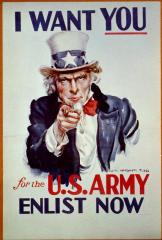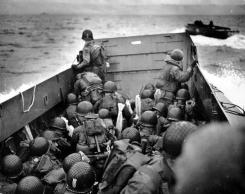Every year on this particular day, I find myself thinking about my father. For you see, it was on this day sixty-nine years ago that he, along with thousands of other young men just like himself, ran across a gravel strewn beach on the northern coast of France. The man who would become my father was only nineteen years old at the time.

Less than a year earlier, he’d graduated from high school in North Carolina. Without giving it a second thought, he immediately enlisted in the Army. After completing basic training, he was assigned to a unit headed overseas to prepare for the invasion and ultimate liberation of Europe.
As a kid, I was vaguely aware that my dad had been in the Army and had fought in World War II, but since he hardly ever spoke of it, it would take years for me to learn any details concerning his wartime experiences. It was simply not a topic that he talked about. Not so much due to the horrors of war, which he most certainly was witness to, but more so because to this day he really doesn’t believe that what he did was in any way special or out of the ordinary.
Just within the past few years have details started to emerge during casual conversations that I’ve had with him.
After arriving in England to begin training, his unit was taken out into the countryside to bivouac. He told me that when the truck stopped to let his group out, they found themselves in an open field, nondescript except for a number of large standing stones. His unit chose to camp among the stones in the belief that they would provide some protection from the wind. In addition, a couple of the stones, which apparently had fallen over, offered a convenient place to sit or to store gear off the ground. It was not until after the war that he came to realize that his camp ground actually had a name. It was known as Stonehenge.
During the months leading up to the invasion, the men in my father’s unit grew very close. To use the phrase recently coined, they truly became a band of brothers. One of them acquired the nickname “Pappy” because he was the oldest man in the unit. My father told me that Pappy was from Idaho, as were a number of the others. He also told me that during the months of training, he and Pappy had become close friends.
Several days before the invasion, an officer came to speak with Pappy. The officer told him that due to his age, he could choose not to participate in the invasion, in which case he would be reassigned to a non-combatant position. Pappy immediately rejected the idea, telling the officer that it wouldn’t be right for him to pull out after going through all of the training and preparation for the invasion.

In the early morning hours of June 6, 1944 my father, along with the rest of his unit, landed in Normandy at a place designated as Omaha Beach. It’s only within the past couple of years that he’s spoken with me about the landing. When the doors of the landing craft dropped, he jumped into chest deep water and began to struggle toward the beach. He remembers having only a single thought, which was to get across that beach as quickly as possible.
Once out of the water, he found himself running beside Pappy. Suddenly there was a flash of light and a tremendous explosion which knocked both of them off of their feet and on to the beach. A motar shell had fallen just on the other side of Pappy. In an instant, my father realized that Pappy would go no further. His war had ended.
When the movie “Saving Private Ryan” was released, my dad couldn’t decide whether or not he wanted to see the film. Frankly, he wasn’t sure how he would react to it emotionally. Finally, after it had been at the local theater for several weeks, he went to see it, but only on a day and at a time when he knew there wouldn’t be many others in attendance.
The film opens with a very graphic depiction of the fighting which occurred during the landing on Omaha Beach. I asked him if he thought that the film had accurately portrayed what it had been like for him on that day. He told me that the events and conditions on Omaha Beach had been significantly more chaotic than was shown in the movie. His over-riding recollection is that the German machine gun fire and mortar rounds were blanketing the beach to such an extent that as he was running across it, he felt as if he were swimming in a thick soup made up of sand and pebbles.
My father went on to fight across France and into Belgium. He was awarded the Bronze Star for heroism under fire. During the Battle of the Bulge he was severely wounded and spent the rest of the war in a hospital in England before coming back home.
So yes, every year on this particular day, I find myself thinking about my father. But I also remember the others who I never knew, like the man from Idaho who I know only as Pappy. I think about the sacrifices that they so readily made for the rest of us and I remind myself to never forget them.
They are without question the Greatest Generation. God bless them all.
OM
Photo credit: D’oh Boy (Mark Holloway) / Foter.com / CC BY
Photo credit: Conseil Régional de Basse-Normandie / National Archives USA /Foter.com / Public domain
Thank you for writing this beautiful passage. Thank you to your father for his brave service.
Thanks for the comments.
Thank you for posting this. I am in the process of recording my own piece of D Day history – it will be up on my blog later today.
Thanks for taking time to read my post. I’ll be stopping by to read yours later today.
It’s funny how the younger generations don’t realize the sacrifices that were made for them, by a generation that could have chosen not to resist the Axis powers. I wonder what they would be willing to fight and die for?
We’ve done far too good of a job over the past 50 years of NOT teaching succeeding generations about the uniqueness of our country and what we as a people have always stood for. Hopefully, we’ll wake up again.
Reblogged this on New American Gospel! and commented:
A special thank you to all those who saved the world on that day in June. Much respect. — J.W.
Thank you very much.
Very readable, and well-worth it too.
Some years back, I finally learned to make a point of asking the veteran – directly – if he’d care to share anything of their experience with me, as every one I’ve had the privilege to meet is/was as quiet as your father. (And my best guess is, for the same reason(s).)
My dad was also a D-Day (and Dunkirk) veteran – British Army, Sword Beach. It took him many years to be able to talk about it. Thank-you for your post – much appreciated.
Thank you for the comments. I appreciate your father’s service as well.
Thanks for the reminder.